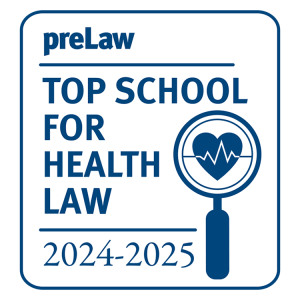Customize the Health Law Certificate to meet your career goals
Health Law is a rich and diverse practice area, encompassing health policy, transactional and corporate work, compliance and regulation, public health, and health care litigation, among others.
Mitchell Hamline’s Health Law Certificate can be customized to meet your specific professional goals. It will provide you with a firm foundation through our advanced curriculum, experiential learning opportunities, and extracurricular activities intended to provide you with access to health law attorneys and networking opportunities.
This program has received an A+ rating by the National Jurist, and ranked #26 nationally by U.S. News & World Report, based on the extent of our curricular offerings.
HLC Curriculum and Requirements
Courses are taught by Mitchell Hamline faculty, as well as top industry professionals, who all specialize in health law. The Health Law Certificate is comprised of 10-12 credits. These credits count towards your J.D. degree, and many concurrently satisfy other J.D. requirements. To receive your certificate upon graduation, J.D. students are required to maintain a 3.0 GPA or higher in the program curriculum listed below. Note: J.D. students are not able to use their pass/fail option on a required certificate course, as this effects your certificate GPA.
1. Doctrinal Courses (8-9 credits)
Make sure to visit the HLI Course Schedule page to confirm course availability to be more planful with your schedule.
- Health Law: Quality of Care and Liability (3 credits)
- Health Law Organization and Finance (3 credits)
- Administrative Law (3 credits)
or
Drug and Device Law (2 credits)
or
Health Law Clinic (2 credits)
or
Food Law (2 credits)
2. Experiential Learning (at least 2 credits)*
Experiential learning is the cornerstone of the Health Law Certificate
Opportunities include:
- Participating in the Medical-Legal Partnership: Health Law Clinic, where students have the opportunity to assist low-income clients facing legal challenges affecting their health.
- Participating in a Health Law Externship where students have the opportunity to gain real-world experience in a health care setting from practicing health law attorneys.
- Volunteering or a paid position in an approved health law setting (seek guidance from faculty health law advisor)
- Completing a Health Law Residency: an intensive, high-credit fieldwork experience.
*Students may petition for an exception to this requirement if they are engaged in a position where they are exposed to significant health law, regulatory, or policy matters. You can email the HLI Program Administrator with inquiries about this exception.
3. Advanced Research & Writing Project in Health Law
All students must complete an Advanced Research & Writing (ARW) paper as a requirement for graduation from Mitchell Hamline School of Law. Students wishing to earn a Health Law Certificate must complete an ARW project on a health law subject. This requirement can be completed through a seminar course or as an independent study. To meet this requirement, students must work with a Health Law Institute faculty member on their paper or get topic and advisor approval from the director prior to beginning the paper.
4. Extracurricular Activities
In addition to the 10-12 credits, students must participate in at least six extracurricular activities or events. These activities and events are intended to expose students to a variety of health law issues and topics and serve as exceptional networking opportunities. These activities and events may include lectures, conferences, symposia, CLEs, or breakfast/lunch meetings. They may be sponsored by MHSL, MSBA, or other schools or associations.
If you’re looking for events to complete this requirement, here are some helpful external resources:
- Faegre Drinker’s monthly legal webinar series on food law topics
- MSBA’s Food, Drug, and Device Law section
- MSBA’s Health Law Section
- The Network for Public Health Law hosts webinars and conferences
Students are required to keep track of the activities or events they attend, and report them on the requirements checklist for credit. You will need the title of the event, date, and brief description if not hosted by MHSL.
Notice of Intent
Students are encouraged to apply early in their law school tenure. Declaring an intent to pursue a Health Law or Health Care Compliance Certificate creates no obligation to complete one. It does, however, provide students access to a health law advisor who can assist with curricular decisions and experiential learning opportunities. Students are strongly encouraged to meet with their advisor at least annually to ensure they are meeting all necessary certificate requirements.
Mitchell Hamline J.D. students have the unique opportunity to earn both the Health Law Certificate and the Health Care Compliance Certificate concurrently without compromising access to important fundamental courses including those heavily tested on the bar exam.
Notice of Intent FormRequirements Checklist for JD Students
Each student graduating with the Health Care Compliance Certificate and/or the Health Law Certificate must complete their requirements checklist prior to graduation.
Requirements ChecklistQuestions?
Contact the Health Law Institute at [email protected].
